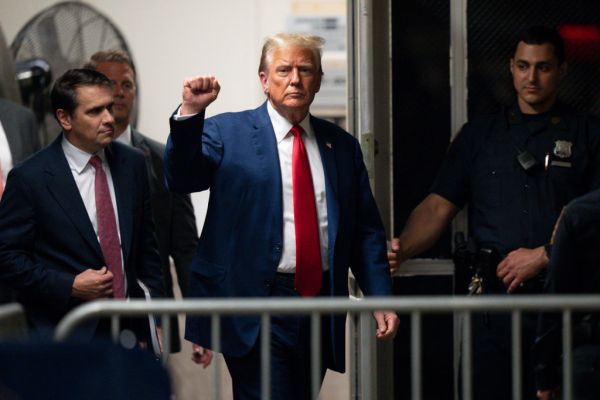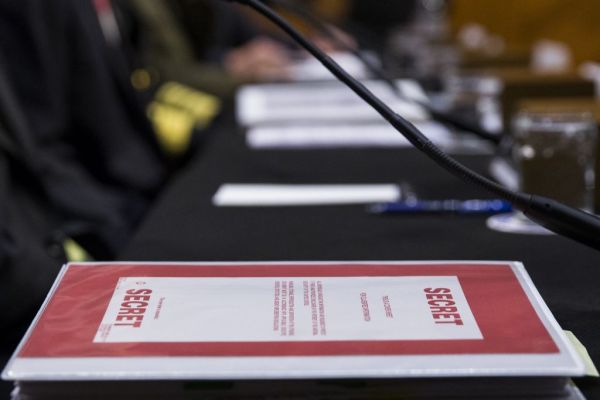Presumptive Republican presidential nominee Donald Trump has recently dropped hints that his decision on a running mate is near—or possibly already made. The selection of one of the people considered to be his shortlist for vice president—Sen. Marco Rubio of Florida—would pose an unusual Constitutional complication.
The three-term senator from Florida seems well-suited for the Republican ticket—as a son of Cuban immigrants he could appeal to Hispanic voters, at age 52 he is relatively young, and he brings legislative experience in national security and foreign policy. But as Trump has said, “Marco has this residency problem.”
Trump and Rubio’s status as Florida residents runs afoul of the 12th Amendment, which states that members of the Electoral College “shall meet in their respective states and vote by ballot for President and Vice-President, one of whom, at least, shall not be an inhabitant of the same state with themselves.”
The history of the 12th Amendment.
Before the 12th Amendment was ratified in 1804, members of the Electoral College would cast two votes for president, with the top vote-getter becoming president and the second-place finisher becoming vice president. But, according to Article II of the Constitution, electors could not vote for two candidates from their own state.
“It’s one of these odd features of the Constitution,” Sanford Levinson, a professor at the University of Texas School of Law, told The Dispatch.
As Levinson explains, electors would vote for who they felt would be “the two best candidates for president.” However, the 1800 presidential election exposed flaws in the process: An Electoral College tie between Thomas Jefferson and “running mate” Aaron Burr, both candidates for the Democratic-Republicans, sent the election to the House of Representatives. It took 36 ballots for the House to name Jefferson the winner.
The contentious election resulted in the ratification of the 12th Amendment in 1804, allowing electors to vote for president and vice president separately. However, the restriction against electors voting for two residents of their own state remained from the old system.
Constitutional scholars aren’t certain why the Constitution included the same-state rule. But Levinson says it might be related to Virginia’s overrepresentation in the country’s early leadership. “I think it was an effort to prevent Virginians from simply dominating the executive,” he said. Four of the first five presidents were from Virginia. “It forces people to look nationally for the second person.”
The implications for a potential Trump-Rubio ticket.
While the Constitution doesn’t prohibit two candidates from the same state running on the same party ticket, Trump and Rubio would not be able to both receive Electoral College votes from Florida electors, according to the 12th Amendment. With 30 electoral votes in 2024, Florida has the third most of any state and is thus crucial to getting the 270 a presidential candidate needs to win. If Florida electors chose Trump over Rubio, the Senate could end up having to select the vice president if Rubio did not receive a majority of electoral votes for vice president, Levinson said.
A possible way to avoid any 12th Amendment conflicts would be for one of the two candidates to change his residency from Florida to another state. For example, Rubio could switch his residency to Nevada, where he lived for a few years growing up. Under Nevada state law, a person can be a legal resident if they have a legal residence in the state, engage in business in the state, have a motor vehicle housed in Nevada, physically reside in Nevada, or declare themselves a resident of Nevada.
There is precedent for this type of residency switch. Days before becoming George W. Bush’s running mate in the 2000 election, Dick Cheney changed his residency from Texas, where he had lived for several years while serving as CEO of Halliburton, to Wyoming. Cheney had significant connections to the state, having been a Wyoming congressman for 10 years. Despite Cheney’s Wyoming ties, the change was still challenged in court, albeit unsuccessfully.
Levinson says Cheney’s strategy could work for Rubio. “You have a right to settle wherever you want in the United States once you’re a citizen,” he said. He thinks it would be tough to find any grounds to challenge the residency change in court, especially after the failed challenge to Cheney’s switch.
And if Trump were to select him as his running mate, Rubio would have time to figure out the details. His residency would not have to officially be changed until December 17, according to Levinson, when electors cast their votes.
The situation with Rubio’s Senate seat would be more complicated. He could resign before he changes residency, or he could still hold his seat while living in another state, since Article I of the Constitution establishes that a senator must be an inhabitant of the state they represent only “when elected.” However, this likely would be challenged in court if Rubio changed his residency. “I would expect a lawsuit to be filed immediately saying that he had to vacate his seat,” Levinson said.
Another avenue for avoiding a 12th Amendment problem would be for Trump to change his residency—again. He was a New York state resident until September 2019, when he changed his residence to Mar-A-Lago in Florida. If he were to return to New York, he would need to spend at least 184 days in the state before he could officially be classified as a New York resident.
The 12th Amendment’s residency rule doesn’t pose an insurmountable challenge to a Trump-Rubio ticket, Levinson said. “You can make it instantly inoperative simply by picking yourself up, going to an adjoining state, getting a driver's license, and saying, ‘I'm home.’”






Please note that we at The Dispatch hold ourselves, our work, and our commenters to a higher standard than other places on the internet. We welcome comments that foster genuine debate or discussion—including comments critical of us or our work—but responses that include ad hominem attacks on fellow Dispatch members or are intended to stoke fear and anger may be moderated.
With your membership, you only have the ability to comment on The Morning Dispatch articles. Consider upgrading to join the conversation everywhere.